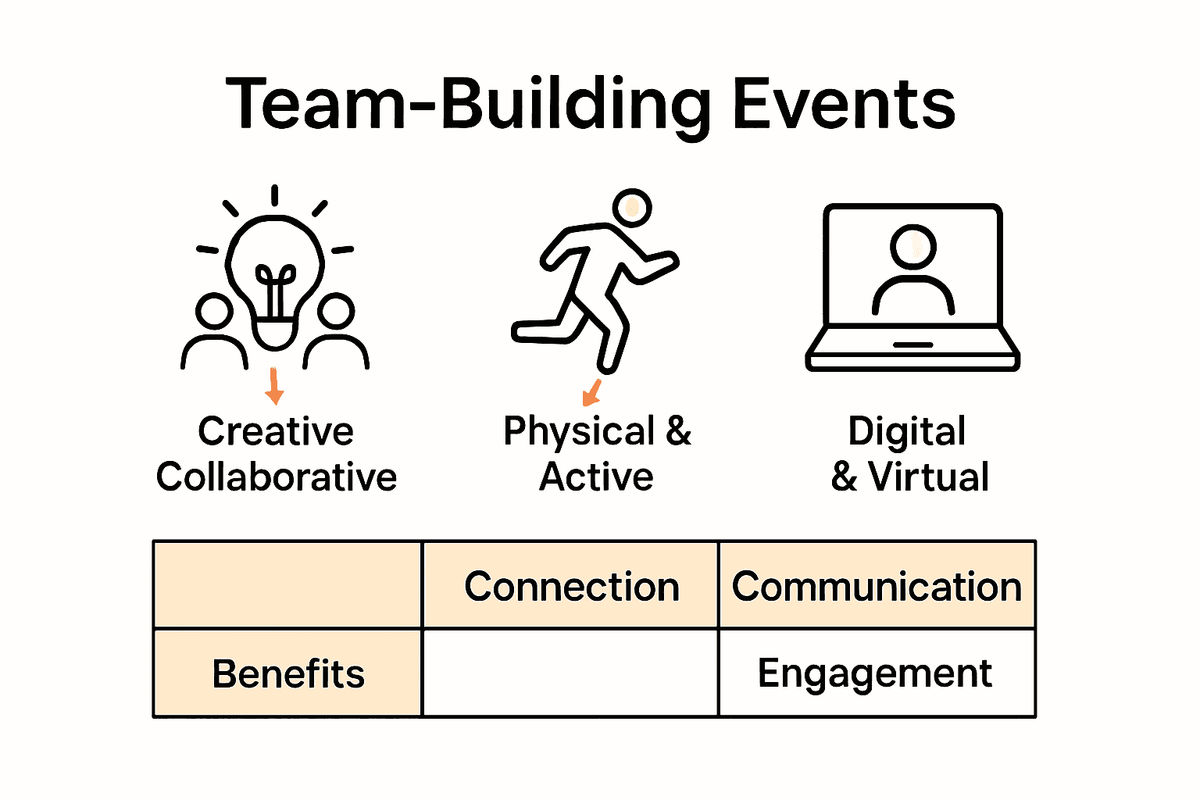Purpose of Team Events: Complete Guide for Managers
November 4, 2025

Did you know that strong teams are up to 25 percent more productive than poorly connected ones? Team events are not just about having fun with colleagues. These gatherings are carefully designed to build trust, improve workplace communication, and bring people together in meaningful ways. When organizations invest in activities that encourage collaboration and connection, they lay the groundwork for higher morale, smoother workflows, and long-lasting success.
Table of Contents
- Defining Team Events And Their Core Purpose
- Popular Types Of Team Events Explained
- Key Benefits For Team Building And Culture
- How Team Events Foster Collaboration And Trust
- Measuring Success And Common Pitfalls To Avoid
Key Takeaways
| Point | Details |
|---|---|
| Core Purpose of Team Events | Team events aim to enhance communication, collaboration, and interpersonal relationships within organizations, fostering a cohesive team dynamic. |
| Diverse Event Types | Activities can be categorized into creative, physical, and digital experiences, each tailored to specific team dynamics and organizational objectives. |
| Benefits of Team Building | Effective team building leads to improved communication, psychological well-being, and essential skill development, contributing to overall organizational success. |
| Continuous Improvement | Measurement of team events' effectiveness, including qualitative and quantitative assessments, is crucial for adjusting strategies and achieving desired outcomes. |
Defining Team Events and Their Core Purpose
Team events are strategic gatherings designed to enhance group dynamics, improve communication, and foster collaboration among organizational members. According to Wikipedia, team building encompasses various activities specifically aimed at improving social relations and defining roles within teams through collaborative tasks.
Corporate team events serve multiple critical purposes beyond simple entertainment. They provide structured opportunities for colleagues to interact outside traditional work environments, breaking down hierarchical barriers and encouraging genuine interpersonal connections. As defined by Wikipedia, these events range from team-building exercises to award ceremonies, with the fundamental goal of boosting team cohesion and organizational morale.
The core objectives of team events typically include:
- Strengthening interpersonal relationships
- Improving communication skills
- Identifying and developing team members' strengths
- Creating a more collaborative workplace culture
- Reducing workplace stress through shared positive experiences
Successful team events are carefully designed to balance structured activities with opportunities for organic interaction. They recognize that meaningful connections cannot be forced but can be strategically facilitated. For more insights on organizing impactful team-building experiences, check out our guide on how to organize team building events.
Effective team events go beyond mere socializing. They are intentional interventions that help transform groups of individual workers into cohesive, high-performing teams. By creating shared experiences, challenging participants collaboratively, and fostering an environment of mutual respect and understanding, these events become powerful tools for organizational development.
Popular Types of Team Events Explained
Team events come in diverse formats, each designed to achieve specific organizational objectives. According to GoToEvents, these activities can be broadly categorized into creative sessions and interactive challenges that foster different aspects of team dynamics.
Team Building Categories typically include several strategic approaches:
- Creative Collaborative Events
- Project design challenges
- Problem-solving workshops
- Innovation brainstorming sessions
- Physical and Active Events
- Outdoor adventure challenges
- Sports tournaments
- Fitness-based team competitions
- Digital and Virtual Experiences As highlighted by SurfOffice, virtual team-building activities have gained significant traction, especially for remote teams. These digital experiences include:
- Online game challenges
- Code-breaking puzzles
- Virtual escape rooms
- Interactive digital quizzes
These varied event types serve different purposes, from boosting morale to enhancing problem-solving skills. For comprehensive strategies on designing effective team interactions, explore our guide to team-building concepts.
Here's a summary of popular team event types and their key features:
| Event Type | Typical Activities | Main Benefits |
|---|---|---|
| Creative Collaborative | Project design challenges Brainstorming sessions | Boost innovation Strengthen problem-solving |
| Physical & Active | Adventure challenges Sports tournaments | Improve energy Encourage teamwork |
| Digital & Virtual | Online games Virtual escape rooms | Engage remote teams Enhance digital skills |
The key is selecting events that align with your team's specific needs, skill levels, and organizational culture. Whether through creative projects, physical challenges, or digital experiences, the goal remains consistent: transforming individual contributors into a cohesive, high-performing team.

Key Benefits for Team Building and Culture
Team building is far more than a corporate buzzword. According to Wikipedia, effective teamwork fundamentally transforms organizational dynamics by improving communication, coordination, and cooperation, ultimately resulting in higher quality outputs and increased member satisfaction.
Core Benefits of Team Building extend across multiple dimensions of organizational performance:
- Enhanced Communication
- Breaking down interdepartmental barriers
- Improving information sharing
- Creating more transparent workplace interactions
- Psychological and Emotional Well-being
- Reducing workplace isolation
- Building mutual trust and respect
- Creating supportive work environments
- Skill Development As noted in Wikipedia, team-based approaches significantly enhance problem-solving capabilities and collaborative skills essential for professional growth. These skills include:
- Strategic thinking
- Collaborative problem resolution
- Adaptive communication techniques

For managers seeking to implement robust team-building strategies, our guide to successful team-building tips offers comprehensive insights into creating meaningful team experiences.
Ultimately, team building is an investment in human potential. By fostering environments that prioritize mutual understanding, skill development, and collective achievement, organizations can transform individual talents into powerful, synergistic team performances that drive sustainable success.
How Team Events Foster Collaboration and Trust
Collaboration and trust are not spontaneous workplace phenomena but carefully cultivated outcomes. According to Wikipedia, teams with members possessing complementary skills can generate extraordinary synergy through coordinated efforts, allowing each individual to maximize their strengths and minimize potential weaknesses.
Mechanisms of Trust Building through team events include:
- Vulnerability and Shared Experiences
- Creating safe spaces for authentic interactions
- Encouraging personal storytelling
- Breaking down hierarchical barriers
- Skill Recognition
- Highlighting individual team member capabilities
- Demonstrating interdependence
- Promoting mutual respect
- Communication Skill Development As explored by Wikipedia, modern collaborative environments increasingly rely on communication technologies that can enhance inclusivity and trust by mitigating cultural and physical limitations.
Managers seeking deeper insights into building team dynamics can explore our guide on encouraging team bonding, which offers strategic approaches to nurturing workplace relationships.
Ultimately, trust is a deliberate investment. By designing team events that challenge, support, and celebrate individual contributions, organizations can transform abstract workplace connections into robust, reliable collaborative networks that drive collective success.
Measuring Success and Common Pitfalls to Avoid
Effective team events require strategic assessment and proactive management. According to Wikipedia, the effectiveness of teamwork can be comprehensively evaluated by examining three critical dimensions: the quality of output, the collaborative process undertaken, and team members' overall satisfaction.
Key Performance Metrics for team events include:
- Quantitative Measurements
- Participant engagement levels
- Immediate feedback scores
- Post-event productivity changes
- Knowledge retention rates
- Qualitative Assessments
- Team communication improvements
- Observed behavioral shifts
- Interpersonal relationship enhancements
- Individual skill development
- Potential Pitfalls to Monitor As highlighted by research from ArXiv, virtual and in-person team collaborations face significant challenges such as:
- Technical interaction constraints
- Reduced cross-team communications
- Potential for social loafing
- Unequal participant contributions
For managers seeking comprehensive strategies to navigate these challenges, our guide to managing team dynamics provides actionable insights.
Successful team events are not about perfect execution but continuous learning. By implementing robust measurement techniques, maintaining flexibility, and staying attuned to team dynamics, managers can transform potential pitfalls into opportunities for genuine organizational growth and team development.
Elevate Your Team Events with Engaging Interactive Games
The article highlights the importance of purposeful team events to build trust, improve communication, and foster collaboration. If you are a manager striving to create meaningful experiences that go beyond traditional sessions, customizable team-building games are your key solution. They address common challenges such as maintaining high engagement, encouraging participation, and fostering collective problem-solving—all vital elements discussed in the guide on how to organize team building events.

Transform your gatherings into vibrant, fun, and impactful moments using quizado.com. Our platform offers interactive quiz games inspired by popular shows to stimulate connection and teamwork, whether your team meets online or in person. Ready to boost collaboration and spark fresh energy in your next event? Explore our successful team-building tips and start designing your unique experience today. Take a proactive step to strengthen your team dynamics now by visiting quizado.com.
Frequently Asked Questions
What are the main purposes of team events?
The main purposes of team events include strengthening interpersonal relationships, improving communication skills, identifying and developing team members' strengths, fostering a collaborative workplace culture, and reducing workplace stress through shared positive experiences.
What types of activities are included in team-building events?
Team-building events can be categorized into creative collaborative sessions (e.g., project design challenges, brainstorming), physical and active events (e.g., outdoor challenges, sports tournaments), and digital or virtual experiences (e.g., online games, virtual escape rooms).
How do team events contribute to employee well-being?
Team events contribute to employee well-being by reducing workplace isolation, building mutual trust, creating supportive environments, and enhancing psychological and emotional well-being through shared experiences and positive interactions.
What metrics can be used to measure the success of team events?
Key performance metrics for measuring the success of team events include quantitative measurements such as participant engagement levels, immediate feedback scores, and post-event productivity changes, as well as qualitative assessments like communication improvements and observed behavioral shifts.
What's next?
Ready to have fun?
Download Quizado free and host your first game show tonight!




